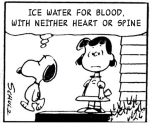Mike Masnick, writing for Techdirt this week, brought the plight of Lauren LoPrete to wider attention. LoPrete is the creator behind the delightful Tumblr site This Charming Charlie, and, the recipient of take-down actions which claimed that her work violated American copyright law.
LoPrete combines snippets of lyrics from The Smiths with Peanuts comic strips, drawn by Charles Schulz (1922-2000), to delightful results. However, Universal Music Publishing Group (the licensing arm of The Smiths), issued multiple take-down notices to Tumblr, arguing that LoPrete had engaged in copyright infringement.
Under American law, in order to avoid liability, Internet Service Providers must remove allegedly infringing material without dwelling on details such as due process. According to Tumblr’s Terms of Service (dated to 2012-03-22), after the removal, a subscriber may file a counter-notification (which must include his or her name, address, telephone number and email address) to the Internet Service Provider, which is then forwarded on to the complainant. If the complainant does not take further action within ten days, the material “may be restored.”
LoPrete initially chose to discontinue her work. But, after she posted a farewell message, lawyers rallied to the cause and offered pro-bono services to help reinstate her work. The firm of Booth Sweet LLP responded accordingly to Tumblr:
So much to answer for! Yet our client believes in good faith that these three posts, like all posts on her charming website, do not infringe the copyright for any Smith’s lyrics as they constitute fair use in accordance with 17 U.S.C. § 107. …
Their explanation covers the salient details (the use is transformative*, very little of the lyrics are used in each strip, and the new works in no way compete with the market of the songs) with admirable clarity and brevity. As to whether the works are reinstated, Universal has five more days to ponder their actions. Covering this story for MotherBoard, Fruzsina Eördögh writes: “When it comes to DMCA take-downs on the Internet, no one is more Lucy van Pelt-like than Universal.” And so we wait for September 30.
Amusing as this story is, particularly in its David v. Goliath dimension, and admirable in its ingenuity and creativity, it also serves to illustrate a vital difference between American and Canadian copyright law.
Canadian Internet Service Providers (ISPs) are shielded from aggressive (and possibly baseless) copyright claims by virtue of the Canadian system of notice-and-notice. ISPs must convey complaints to subscribers, and maintain suitable records should the issue lead to litigation; that is all. ISPs are not required to remove material, disconnect subscribers, betray subscriber privacy, or take on the risk of liability.
However, if the TransPacific Partnership Agreement (TPP) should come to Canada, that sensible, made-in-Canada approach becomes a thing of the past. Canada would be obligated to adopt the notice-and-takedown approach of the United States. In an appearance to the House of Commons Standing Committee on Trade in June 2013, Michael Geist emphasized the backwardness of the TPP in connection to Canadian copyright law; specific to ISP liability he said:
This approach establishes the obligations for Internet providers and intermediaries when there are claims of copyright infringements, and grants copyright holders powers to raise allegations of infringement with the sites and their subscribers. Moreover, it protects the privacy of subscribers and does not result in takedowns of content based on mere allegations. During the debates on Bill C-11, Canadian Heritage Minister James Moore repeatedly pointed to notice and notice as an example of a positive Canadian-specific approach. Yet according to leaked documents, the TPP would require that Canada drop its approach in favour of a more draconian takedown system that could stifle free speech and result in the removal of content without the need for any proof of infringement.
Two years earlier, when Parliament explored amendments to Canadian copyright law (through then-named Bill C-32, which later became Bill C-11, which passed in June 2012 and entered into law in November 2012) Geist wrote about the effectiveness of notice and notice, as documented by the ISPs themselves. For instance:
… Rogers came prepared with evidence about how the system functions and on its effectiveness. It reports that it processed 207,000 notices in 2010, sending those notices to about five percent of its customer base. In other words, 95% of its subscribers are not identified by rights holders as copyright infringers – far from the piracy haven that it often claimed. Of the households that receive notices, only 1/3 receive a second notice. Of those that receive a second notice, only 1/3 of those receive a third notice. …
Returning to the immediate comparison, Canada does fall short of United States copyright law in one respect; the continued structure of fair dealing as a set of specified categories. Americans enjoy fair use’s language of “for purposes such as …” which gives shelter to uses that do not fit a set purpose. A scenario not uncommon in art, as I have identified in a post prior to the last amendments; see sometime art is just art. Fortunately, Canadians now have an expanded set of categories for fair use: research, private study, criticism, review, news reporting, education, parody and satire. And with continued reminders from our Supreme Court that fair dealing should be interpreted liberally, one can hope that artistic endeavor will more comfortably fall within fair dealing.
* Note: neither American nor Canadian law requires that a use be transformative before it can be considered fair use or fair dealing. The factor of transformation lends itself to discussion of new works, but is irrelevant in questions of unauthorized copying where the purpose is to disseminate the original work. In those situations, other aspects of the fairness analysis are germane.
Update — September 28, 2013 Good news. The Los Angeles Times editorial board writes that Universal is dropping the claim of infringement.

